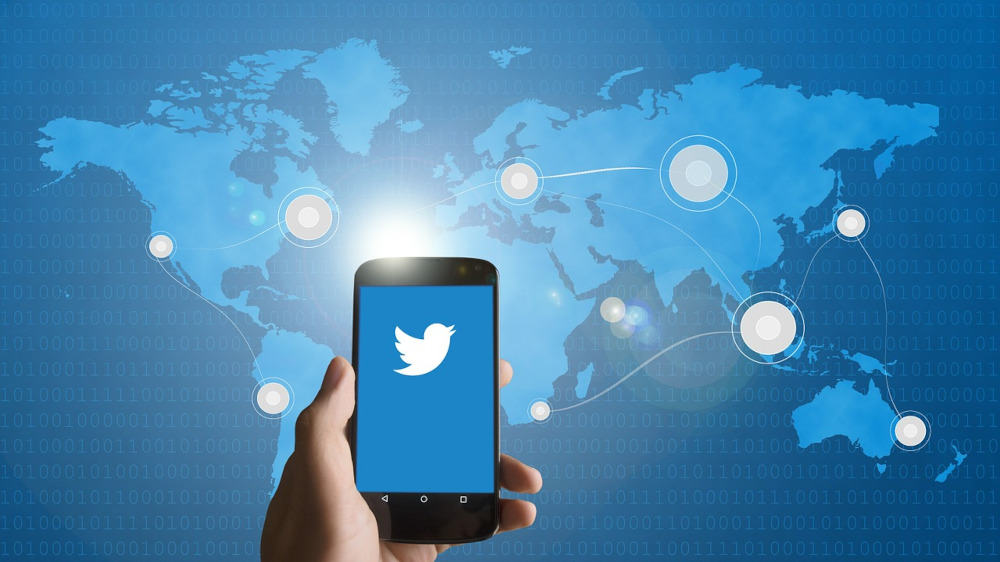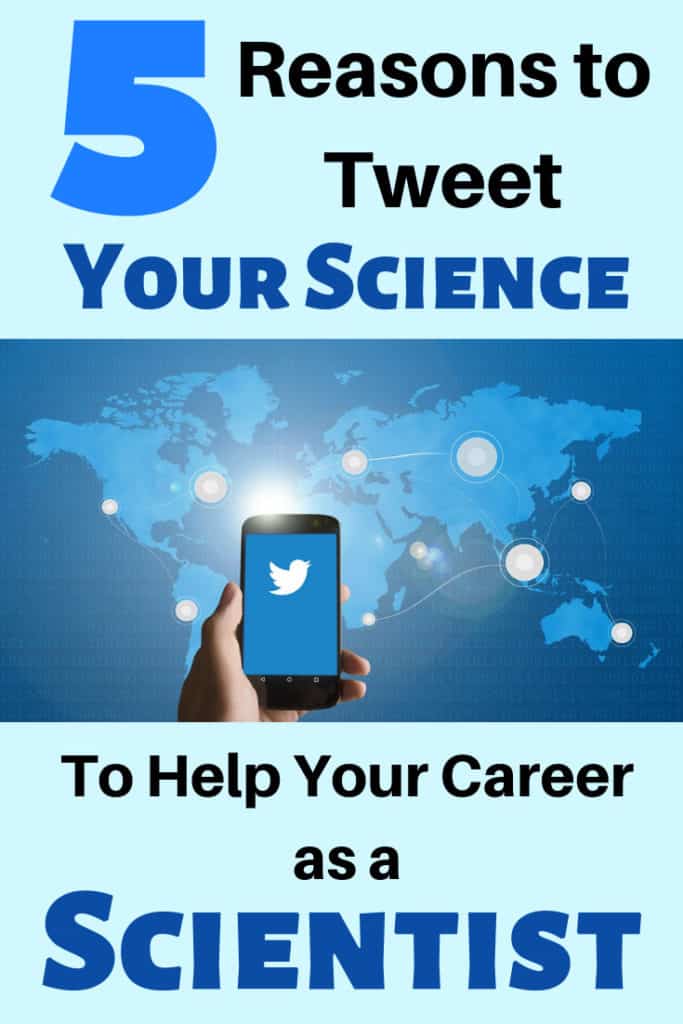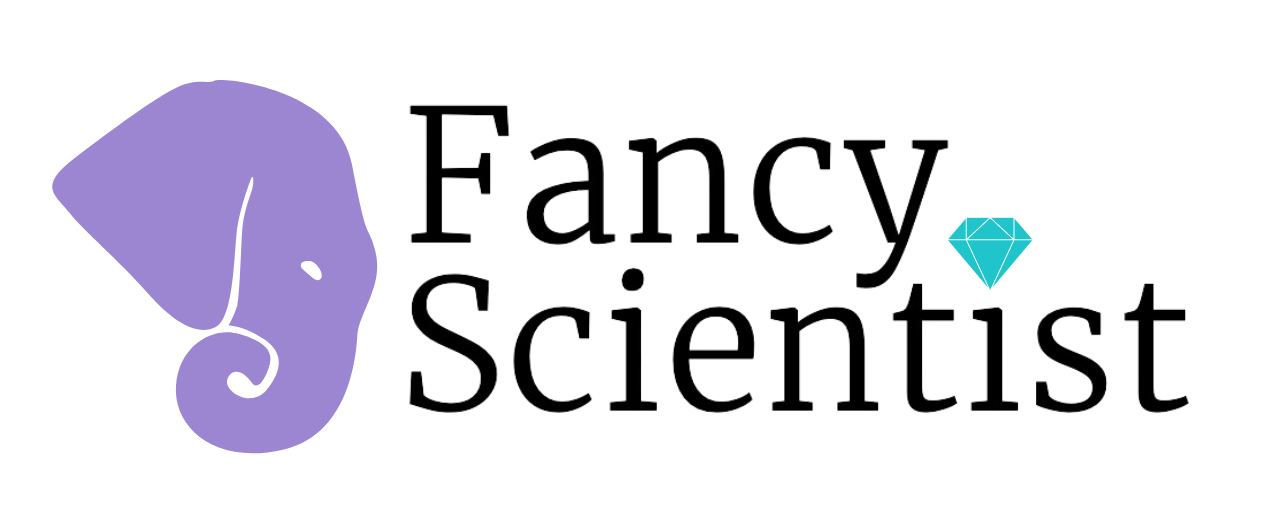I personally started my Twitter account for to communicate my research to the world, but I am constantly surprised by all of the benefits I’ve received from this little account in relation to my professional career. I just attended a large, international conference and discovered there are still SO MANY scientists not on Twitter.
While I understand not every scientist wants to communicate their science through social media, I’m here to tell you that Twitter can really benefit your career as a scientist. I think this is especially true for students and early career researchers. In this post, I’ll cover 5 reasons why you may want to tweet your science.

1. It Helps You Meet People
This is by far the biggest impact I’ve seen from Twitter. Yes, you can definitely develop professional relationships and virtual friendships from social media, but Twitter helps you meet those people in real life too. This is especially true at conferences. Here’s how it works.
Twitter is a powerful tool! 3 months ago I put out a tweet looking for a job/postdoc and that tweet led to new collaborations and a job opportunity! On Friday I start a permanent research ecology position!
— Katie Hooker, PhD (@BioHook85) September 14, 2020
Shoot your Twitter shot!! pic.twitter.com/Te8KcRaV42
When you attend conferences, they should provide a conference hashtag. For example, I am at the International Congress for Conservation Biology conference, which uses the hashtag #ICCB2019. During this conference and maybe up to a few weeks before, I will follow this hashtag (I use Tweetdeck) and I will include it in all of my tweets when I am referencing the conference. By doing this, other people who go to the conference can see your tweets.
When you tweet frequently about the talks you are going to and what’s happening at the conference, other conference attendees on Twitter start to get to know you. I am now at the point where people come up to me at conferences, introduce themselves, and tell me they know me from Twitter! (side note: I am writing this at ICCB in between sessions and while I was sitting here writing, this happened just now. Someone who knows me from Twitter stopped to talk to me. We had a fantastic conversation and I will definitely be reaching out to him in the future, possibly for a collaboration).
You can also use the conference hashtag to actively meet other people. For instance, I’ve seen people advertise social gatherings on Twitter that are open to anyone or even people asking for someone to go to lunch with. Just two days ago, a tech for wildlife happy hour was advertised on Twitter. If I were not for Twitter, I would not know have known about this event. I went to the conference alone and might have stayed in for the night without a group to join and people to hang out with.
If you're at #iccb2019 and interested in #tech4wildlife, join us for a tech happy hour this evening! Come meet other people working with all things tech. See you there, 7:30 at Skybar. Everyone welcome. Tweet us if you get lost and we'll help you find us. pic.twitter.com/lvVG9DwxFb
— WILDLABS Community (@WILDLABSNET) July 22, 2019
If you are going to a conference alone, Twitter is huge for social networking! It’s a fantastic way to meet people. I’ve even seen people tweet that they are going to lunch and looking for people to eat with. A few minutes later, other people tweet back and the next thing you know, you are not eating lunch alone.
2. You Can Follow Conferences You are Not Attending
Staying on the conference theme, Twitter allows you to follow conference sessions without being there. People often live tweet conference sessions they are sitting in, providing information from the speaker’s research they are presenting.
Conferences are expensive! Or maybe you have a scheduling conflict. You can still keep your eyes on tweets to see what’s going on and even participate in the conference indirectly by responding to and commenting on tweets.
Targeted gene flow could prevent fast dispersing cane toads from invading the Pilbara. Fascinating work and a great presentation by @adams_smart at #ICCB2019 pic.twitter.com/azO9wvkfty
— Erica Marshall (@Erica_Marshall1) July 25, 2019
3. You Can Get Career Advice
Even if you don’t want to tweet your science, it’s still worth setting up a Twitter account to follow conferences and get career advice. Many scientists will start conversations with broad questions and some of these questions really gain traction.
Use the hashtags #ScienceTwitter and #AcademicTwitter to get in the loop of many of these conversations.
You can also pose your own questions to ask for help. Sometimes when I need help with analyses, I will pose a question on Twitter, but you can also ask more general career advice. Note that this will work best if you are an active tweeter and engage with others.
Hey science Twitter, why did you decide to get a master's or a PhD?
— 🇩🇲 She Who Resembles God🍉 (@TiPassie) July 8, 2019
4. Twitter Makes it Easier for Media to Find You
When you tweet your science, you establish yourself as an expert in your field. This applies to students too. For example, during my Ph.D., I studied forest elephants. When journalists and other media professionals wanted someone to interview about elephants and they knew I studied elephants because they followed me, they were pretty likely to contact me. To them, it may not matter if I had three years of experience or 30, and it may even be more difficult for them to contact scientists with 30, giving me the advantage.
Media coverage is really important in your career! Many scientists include news stories and articles that they’ve been featured in in a section on their CV and write about media features as part of their broader impacts for grant proposals.
5. Decisions are Made on Twitter
As Emily Puckett recently pointed out in her blog post, “Want to Change the Culture of Science? Talk it Over on Twitter,” many discussions about the culture of science and academia are had on Twitter. By being on Twitter, you are not only in the loop of these cultural shifts, but you can also help form them. Missing out on these important discussions can blind-side you, while being on Twitter gives you plenty of advanced warning to know where the field of science is going.
Do you tweet your science to help you in your profession? Write in the comments below how tweeting has helped you as a scientist. To further help your career, make sure you have a professional bio.

Love this post? Share it with friends!


